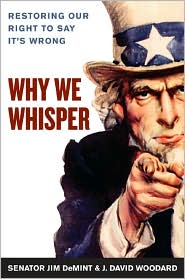By Alexander Bolton
Posted: 09/30/08 11:19 PM [ET]
The billionaire financier George Soros, a major Democratic financial backer, is floating his own rescue plan among Democratic lawmakers who are uncertain what to do in the wake of a surprise defeat of a proposed $700 billion rescue package proposed by Treasury Secretary Henry Paulson.
Soros has outlined his plan in an opinion editorial in the Financial Times and circulated a concept paper among decision-makers.
Specifically, the liberal philanthropist has proposed that government funds should be used to recapitalize the American banking system by purchasing equity in banks and investment firms.
Democratic Rep. Jim Moran (Va.) scheduled a meeting Tuesday afternoon with Robert Johnson, a former manager of the Soros Fund Management, to discuss the proposal.
Moran compared the proposal to Warren Buffet’s $5 billion investment in the investment firm Goldman Sachs Group in return for preferred stock and warrants to buy common stock at a discount.
Soros has also contacted Sen. Barack Obama’s (D-Ill.) presidential campaign to share his views on the financial crisis and the best way to solve it.
Soros described the plan he outlined in his concept paper in an opinion editorial that appeared in the Financial Times early Wednesday morning, Greenwich Meridian Time.
“Instead of purchasing troubled assets, the bulk of the funds ought to be used to recapitalize the banking system,” Soros wrote.
“The Treasury secretary would rely on bank examiners rather than delegate implementation of [the Troubled Asset Relief Program] to Wall Street firms,” he wrote in reference to the plan first crafted by Treasury Secretary Henry Paulson. “The bank examiners would establish how much additional equity capital each bank needs in order to be properly capitalized according to existing capital requirements.”
“The recapitalized banks would be allowed to increase their leverage, so they would resume lending,” he wrote.
Soros has emerged as a harsh critic of the Treasury Department, especially of Paulson’s proposal for the government to buy $700 billion of distressed mortgage-backed securities to restore the flow of credit in the financial markets.
It is unclear whether his entry onto the debris-strewn field of the debate will help lawmakers reach agreement on an alternative proposal or further anger House Republicans, who blew up a compromise plan on the House floor Monday.
“The two main principles are to inject more cash into the securities market and shore up home mortgages,” said Moran, who has been briefed on the proposal. “He thinks it has to be more direct than the government buying up tranches. He doesn’t think the government should be buying up toxic stock.”
“There are a lot of people with ideas, I’m going to look at what they want,” said Moran, who added that he also scheduled a meeting with Robert Dugger, managing director of Tudor Investment Corporation, a fund connected with the billionaire trader Paul Tudor Jones.
Soros, who is widely regarded as a financial wizard, could jumpstart congressional negotiations in a new direction, especially now that some strategists believe the Paulson-based plan that failed Monday will be difficult to revive.
One banking industry lobbyist said it would be very difficult politically for Republicans who voted against the package Monday to change their minds and vote for it a few days later. More than two thirds of the House Republican conference voted against the plan, which failed by a vote of 228-205.
Michael Vachon, Soros’s spokesman, said: “There have been a lot of conversations going on about the Paulson plan and George has been very critical of it.”
Democrats are fond of Soros, who has emerged as one of the party’s biggest financial backers in recent years. He spent close to $24 million to defeat President Bush in the 2004 election.
For this reason Soros is a bogeyman among many Republicans. He clashed famously with former Republican Speaker Dennis Hastert (Ill.).
During the 2004 election Hastert questioned the source of Soros’s wealth and suggested it could have links to the drug trade.
Soros has fiercely criticized Paulson’s proposal.
“Mr. Paulson’s proposal to purchase distressed mortgage-related securities poses a classic problem of asymmetric information,” Soros wrote in a Financial Times op-ed dated Sept. 24. “The securities are hard to value but the sellers know more about them than the buyer: in any auction process the Treasury would end up in the dregs.”
Soros would like the government to restore the flow of credit to the financial markets by purchasing equity in companies saddled with distressed assets, said Moran.
The international financier would also like the government to take direct action to shore up the ailing housing market.
“The scheme addresses only one half of the underlying problem -- the lack of credit availability. It does very little to enable house owners to meet their mortgage obligations and it does not address the foreclosure problem,” Soros wrote in Wednesday’s commentary .
“A revised emergency legislation could also provide more help to homeowners,” he wrote of a package based on his own proposals. “It could require the Treasury to provide cheap financing for mortgage securities whose terms have been renegotiated, based on Treasury’s cost of borrowing.”
He has also suggested prohibiting mortgage companies from charging fees on foreclosures. Many companies are quick to foreclose because they no longer own the loan itself, which has likely been turned into a security.
Instead, these companies make money by charging delinquent borrowers during the foreclosure process.
Soros’s plan could find favor among members of the Congressional Black Caucus, many of whom voted against the Paulson-based plan Monday.
Foreclosures of subprime mortgages, considered the root of the housing crisis, affects African-American homeowners disproportionately.
Robert Shapiro, chairman of Sonecon, an economic advisory firm, who served as Commerce Department undersecretary during the Clinton administration, raised questions about Soros’s proposal.
He said that if the government bought stock in troubled firms, a problem would arise regarding how Uncle Sam would be represented as a shareholder.
“How does the government vote the shares?” he asked. “It puts them in a potential conflict of interest. Regulatory interests may hurt the bottom line.”
Wednesday, October 1, 2008
Subscribe to:
Post Comments (Atom)











No comments:
Post a Comment